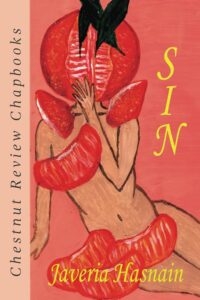The Benefits of Not Knowing Your Audience
Jen Grow
February 22, 2022
For nine months (a full gestation period) I worked in advertising. I got beat up and bruised by an industry that taught me a lot about myself as a writer but left me no time to write.
The pace of that job was frenzied, unbalanced, berserk. Or perhaps that was just the person who trained me. She was a dynamo who sped through the office. Back and forth, up and down the hallway, from the art director to the account managers, through the stairwell to her desk and then off again to track down an answer from the interactive team. Conversations with her were at a breakneck pace. Her refrain, “Yeah-yeah-yeah,” wasn’t dialogue, but a sound meant to bypass whoever was talking so she could plow ahead with her next crucial whatever. She handled projects in several departments at once and worked an obscene number of hours. When she sat at her desk and crossed her legs, her foot fluttered like a hummingbird’s wings. She was legendary for sleeping overnight in the office on multiple occasions, curled up on the conference table, a blanket wrapped around her shoulders. She was leaving to go to law school and had moved to a new city; but first, she was driving four hours a day to train me at work.
I considered it all a form of insanity. However, my boss revered her dedication and pace. Everyone else walked on eggshells around her. Our co-workers got a stricken look when she approached. She had mastered everything in the office except the language of sociability and cooperation.
Advertising is all about knowing your audience. It was clear to me she didn’t.
Craft books and writing courses are filled with advice about knowing your audience. Audience matters, they say. Genre writers need to know who they’re writing for: Fantasy readers? Romance readers? Mystery readers? In order to write effectively, you need to know what it is your readers expect. You might be told in your writing workshops that you need to create a connection. “What does your audience need?” they’ll ask. “What do they want? What do they care about?” You’re supposed to know how to interest your readers, how to inform them, how to help them. Then you’re supposed to keep this audience in mind while you write so you make smart decisions about how to organize your ideas and what information to include. On top of that, you’ll need a commanding narrative voice to draw your readers in. Some might even suggest knowing your readers’ demographic and marketing demands before you type your first word.
Knowing your audience in all these ways is a very tall order. Some of this advice is helpful. If this were an article about craft, I’d tell you what advice I abide by and what I ignore. However, this is about getting creatively unblocked. So, I’ll tell you: ignore all of it. There are benefits to not knowing your audience. In my experience, paying too much attention to your audience gets in the way of writing. Certainly, it gets in the way of creativity. It can intimidate or freeze a writer into not writing.
Why? Because it’s not real. First, your audience out there with all their demographics and expectations is actually you in your head. You’re imagining who they are. What if your research is so thorough and your demographics describe them completely? You’re still imagining what they’ll think. (And you’ve spent all that time doing demographic research instead of actually writing.) Even if you’ve chosen to write to an audience you know personally—a friend or family member—their reactions are still something you’re imagining in your head. They can tell you what they like and don’t like, but you’re the one who is interpreting that information.
This can trip you up. When I write toward an imaginary audience, I imagine their response to the beauty of my prose. I hear them laugh at my jokes and subtle references. Oh, my imaginary audience! They’re so great—they think I’m a genius!
Until they start heckling. Then it’s impossible to please them.
If I’m not careful, they can derail me, or worse, keep me from writing altogether.
Beware of the audience that tells you—loudly or in secret—that your work won’t amount to anything. They’re as bad as the ones that lie and tell you you’re a genius.
This happens to me much less often than it used to, but if it happens to you, too, here’s a trick around that. Get rid of the audience. Those legions of readers? Release them and their expectations altogether. Instead, find one person, one special reader who supports a creative life and write to that person. It doesn’t matter if they’re alive or dead. It doesn’t matter if they never read your work. Just write to them. Better yet, be the person you’re writing for—be your own best reader. Right now, I’m writing this book to my former self who didn’t know these things, and my future self who needs to be reminded regularly. I’m writing the book I wish had been in the world twenty years ago, the book I want to reference now.
And here’s another thing about that audience you’re writing for: They don’t know what they want. They’re fickle. They want to be surprised, but not too surprised.
So, pay attention to feedback, but don’t listen to others when their feedback gets in your way. In this regard, my former co-worker—who sped and jittered through the office as though she were mainlining caffeine—was right. She didn’t pay attention to her coworkers. She steamed ahead to do her thing. Her thing was not my thing, yet she had part of it right. She didn’t let other people’s opinions of her get in her way.
This is important. You’ll have writing workshop buddies, agents, and publishers make suggestions about your writing that might be exactly right. But they might be wrong, too. Certainly, they might be all wrong for you. If you want to, write what you think they’ll like, but make sure it’s what you like, too. If you’re always writing for your audience—real or imagined—then you’re writing for the expectations of others. That’s an unsteady place to be.
Another reason it’s important to talk about audience is because we live in an age of social media when the size of your following can make or break a publishing deal. Managing how we’re perceived can be a full-time job. Literally. There are all kinds of articles about it: “The Highest Paid YouTube stars in 2020!” “The Twenty Most Famous TikTokers in the World!” And all those posts from people clamoring to be influencers. Publishers love this stuff. But it gets in the way.
Being so focused on audience can become an addiction of sorts that will eventually make us miserable. Social media can deaden your creative drive and steal your time, so it is important to take an occasional hiatus. Social scientists have found that people who spend a lot of time engaged with social media, games, texts, and mobile phones are more likely to experience depression. Neuroscientists have also found that social media creates the same chemical reaction in your brain as gambling. Our brains release a hit of dopamine with every “like,” so the more we get, the more we want. Studies have shown that “likes” are not good for our self-esteem. Having an audience becomes a stand-in for getting approval. When that happens, we’re not filling our audience’s expectations as much as we’re expecting them to fill ours.
Ask yourself: What is it that you’re really looking for in your audience? How do you want them to see you? Why is it so important that they view you that way? Are they bringing you self-worth? Acceptance? Security? Approval? If you answer these questions honestly and realize you’re approval-seeking with your audience, then it’s time to admit that you have a co-dependent relationship with imaginary people in your head. Which is delusional.
It’s not only unhealthy for your mind, it’s unhealthy for your writing, too.
For me, audience boils down to this: I’m grateful when anyone reads anything I write, no matter what they think. Even if they only read half of it and misunderstand my point and argue with me about it. I’m grateful they take the time. They could’ve been watching TV. Ultimately, all readers are mystery readers. They are a mystery to us.






